|
|
|
Sort Order |
|
|
|
Items / Page
|
|
|
|
|
|
|
| Srl | Item |
| 1 |
ID:
118972
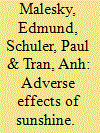

|
|
|
|
|
| Publication |
2012.
|
| Summary/Abstract |
An influential literature has demonstrated that legislative transparency can improve the performance of parliamentarians in democracies. In a democracy, the incentive for improved performance is created by voters' responses to newly available information. Building on this work, donor projects have begun to export transparency interventions to authoritarian regimes under the assumption that nongovernmental organizations and the media can substitute for the incentives created by voters. Such interventions, however, are at odds with an emerging literature that argues that authoritarian parliaments primarily serve the role of co-optation and limited power sharing, where complaints can be raised in a manner that does not threaten regime stability. We argue that under these conditions, transparency may have perverse effects, and we test this theory with a randomized experiment on delegate behavior in query sessions in Vietnam, a single-party authoritarian regime. We find no evidence of a direct effect of the transparency treatment on delegate performance; however, further analysis reveals that delegates subjected to high treatment intensity demonstrate robust evidence of curtailed participation and damaged reelection prospects. These results make us cautious about the export of transparency without electoral sanctioning.
|
|
|
|
|
|
|
|
|
|
|
|
|
|
|
|
| 2 |
ID:
104504


|
|
|
| 3 |
ID:
109718
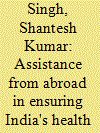

|
|
|
| 4 |
ID:
097412
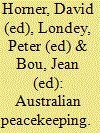

|
|
|
|
|
| Publication |
Cambridge, Cambridge University Press, 2009.
|
| Description |
xviii, 333p.
|
| Standard Number |
9780521735926
|
|
|
|
|
|
|
|
|
|
|
|
Copies: C:1/I:0,R:0,Q:0
Circulation
| Accession# | Call# | Current Location | Status | Policy | Location |
| 055046 | 355.3570994/HOR 055046 | Main | On Shelf | General | |
|
|
|
|
| 5 |
ID:
153710
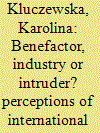

|
|
|
|
|
| Summary/Abstract |
Soon after the breakdown of the Soviet Union in 1991, a civil war started in Tajikistan (1992–97). This was also the period when a number of international organizations arrived in the country to distribute humanitarian assistance and assist in conflict resolution and stabilization. After the UN, the Organization for Security and Co-operation in Europe (OSCE) was the second key organization which appeared in the conflict-stricken country. Like other key international organizations in Tajikistan, the OSCE, which has been in the country since 1994, has seen a shift in its original functions of monitoring and emergency assistance. Some see its avowed objectives in the new century as formalistic, virtual and ineffective. By capturing perceptions of foreign assistance to Tajikistan among employees of the OSCE and other international organizations, NGO workers, government officials and ordinary citizens, this article explores how Tajikistan ‘socialized’ the OSCE, making the organization simultaneously a benefactor, an industry and even an intruder.
|
|
|
|
|
|
|
|
|
|
|
|
|
|
|
|
| 6 |
ID:
119946
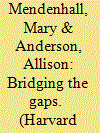

|
|
|
| 7 |
ID:
137349
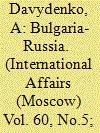

|
|
|
|
|
| Summary/Abstract |
The conference was sponsored by Bulgaria's nongovernmental organizations: the Slavyane Foundation, the Bulgaria-Russia Foundation, the Bulgaria-Russia Forum, and the Federation of Friendship with Peoples of Russia and the CIS. Assistance in organizing the conference was provided by the Diplomatic Institute of the Ministry of Foreign Affairs of the Republic of Bulgaria, the National Association of International Relations, the Bulgarian Diplomatic Society, and the Bulgarian Academy of Sciences.
|
|
|
|
|
|
|
|
|
|
|
|
|
|
|
|
| 8 |
ID:
098756
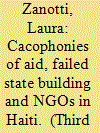

|
|
|
|
|
| Publication |
2010.
|
| Summary/Abstract |
The January 2010 earthquake in Haiti was a catastrophe not only for the loss of life it caused, but also because it destroyed the very thin layer of state administrative capacity that was in place in the country. This article argues that the fragility of the Haitian state institutions was exacerbated by international strategies that promoted NGOs as substitutes for the state. These strategies have generated a vicious circle that, while solving immediate logistical problems, ended up weakening Haiti's institutions. However, the article does not call for an overarching condemnation of NGOs. Instead, it explores two cases of community-based NGOs, Partners In Health and Fonkoze, that have contributed to creating durable social capital, generated employment and provided functioning services to the communities where they operated. The article shows that organisations that are financially independent and internationally connected, embrace a needs-based approach to their activities and share a long-term commitment to the communities within which they operate can contribute to bringing about substantial improvement for people living in situations of extreme poverty. It concludes that in the aftermath of a crisis of the dimension of the January earthquake it is crucial to channel support towards organisations that show this type of commitment.
|
|
|
|
|
|
|
|
|
|
|
|
|
|
|
|
| 9 |
ID:
089353
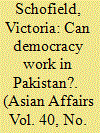

|
|
|
|
|
| Publication |
2009.
|
| Summary/Abstract |
The author argues that military rule has never been good for Pakistan. Historically it has not helped the fight against extremism, On the contrary, the generals' search for some sort of legitimacy has tended to give encouragement to militant Islam. Certainly, the democratic road has been difficult in many countries, but there is no alternative. It is the only road for Pakistan. The West should not give support to anti-democratic forces under the mistaken belief that they can provide firm government.
|
|
|
|
|
|
|
|
|
|
|
|
|
|
|
|
| 10 |
ID:
086256


|
|
|
|
|
| Publication |
2009.
|
| Summary/Abstract |
The paper reviews the experience of the group Nord-Ost (The Regional Social Organisation for Assistance and Defence of the Victims of Terrorist Acts) as an example of an NGO that has taken a rights advocacy position which has led it into confrontation with the state. Nord-Ost demands the state's accountability for the consequences of its response to the 2002 Dubrovka terrorist attack. Thus, it confronts challenges common to other rights advocacy groups in Russia today.
|
|
|
|
|
|
|
|
|
|
|
|
|
|
|
|
| 11 |
ID:
089007
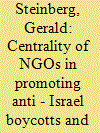

|
|
|
| 12 |
ID:
053781
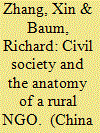

|
|
|
| 13 |
ID:
126448
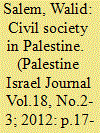

|
|
|
|
|
| Publication |
2012.
|
| Summary/Abstract |
It was as a precursor to the establishment of the Palestinian Authority (PA) in May 1994, when the prospect of state-building entered the political horizon, that the concept of "civil society" became part of the research discourse in Palestine. Questions were posed about economic issues, the proposed structure of the national authority and the feasibility of building a democratic state out of an occupied land. Many feared that the new authority would lean toward authoritarianism rather than democracy - and therefore hoped to find in civil society both a balance for the power of the state and a means of redistributing power. They hoped that civil society would indeed turn out to be, in the words of Palestinian academic George Giacaman, "that societal sphere, in which the individual plays the role of a social actor through the society organizations and in relative separation from the state" (Giacaman, 1995, p.108). This article will consider what it means to discuss Palestinian civil society, trace its historical development, and review the challenges it has faced since 2007 after the political division of the West Bank and Gaza.
|
|
|
|
|
|
|
|
|
|
|
|
|
|
|
|
| 14 |
ID:
138258
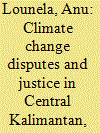

|
|
|
|
|
| Summary/Abstract |
In 2010, the province of Central Kalimantan in Indonesia was established as a Climate Change pilot province to reduce emissions from deforestation and through peat land forest rehabilitation. Today, international agencies, carbon traders, local and national governments, non-governmental organisations, and local populations have participated in debates and disputes over the establishment of carbon forests and forest protection areas in Central Kalimantan. One such scheme, promoted by the government of Australia (Kalimantan Forest and Climate Partnership), intended to establish a REDD+ pilot project within an area that covers about 120 000 hectares in Kuala Kapuas in Central Kalimantan, the field location of this research. This specific dispute offers a case study based on ethnographic research that helps to illustrate how widespread climate change debates and disputes become embedded at local and national levels in Indonesia. The dispute over REDD+ will be discussed within a framework of dispute theories which focus on moments of crisis, wherein participants must present arguments and justify their actions and theories of justice. The article shows that competing and conflicting conceptions of justice that emerge in the dispute may bring to a halt a climate change pilot project in the locality.
|
|
|
|
|
|
|
|
|
|
|
|
|
|
|
|
| 15 |
ID:
085555
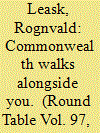

|
|
|
| 16 |
ID:
139097
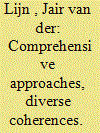

|
|
|
|
|
| Summary/Abstract |
Since 2000, international organisations such as the UN, NATO and the EU, but also countries, have started to apply what has been called the comprehensive approach to crisis management. This article unpacks this comprehensive approach implemented by the Dutch in Uruzgan province, Afghanistan. It first borrows and expands a conceptual framework developed by De Coning and Friis. Subsequently, it maps the different sorts of coherence in the mission by applying the framework. It shows how in practice there was not one single comprehensive approach, but many different forms of interaction between a number of organisational units. Each interaction had its own distinct issues and its own level of coherence. The level of coherence differed depending on the level at which the interaction took place – strategic at headquarters level versus operational at field level – and at what point in the mission it happened – in most cases it moved towards more cohesion.
|
|
|
|
|
|
|
|
|
|
|
|
|
|
|
|
| 17 |
ID:
095057
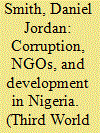

|
|
|
|
|
| Publication |
2010.
|
| Summary/Abstract |
This article examines corruption in Nigeria's development sector, particularly in the vastly growing arena of local non-governmental organisations (NGOs). Grounded in ethnographic case studies, the analysis explores why local NGOs in Nigeria have proliferated so widely, what they do in practice, what effects they have beyond their stated aims, and how they are perceived and experienced by ordinary Nigerians. It shows that even faux NGOs and disingenuous political rhetoric about civil society, democracy, and development are contributing to changing ideals and rising expectations in these same domains.
|
|
|
|
|
|
|
|
|
|
|
|
|
|
|
|
| 18 |
ID:
101919
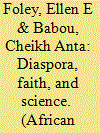

|
|
|
|
|
| Publication |
2011.
|
| Summary/Abstract |
This article examines a development initiative spearheaded by the members of a transnational diaspora - the creation of a medical hospital in the holy city of Touba in central Senegal. Although the construction of the hospital is decidedly a philanthropic project, Hôpital Matlaboul Fawzaini is better understood as part of the larger place-making project of the Muridiyya and the pursuit of symbolic capital by a particular Mouride dahira. The dahira's project illuminates important processes of forging global connections and transnational localities, and underscores the importance of understanding the complex motivations behind diaspora development. The hospital's history reveals the delicate negotiations between state actors and diaspora organizations, and the complexities of public-private partnerships for development. In a reversal of state withdrawal in the neo-liberal era, a diaspora association was able to wrest new financial commitments from the state by completing a large infrastructure project. Despite this success, we argue that these kinds of projects, which are by nature uneven and sporadic, reflect particular historical conjunctures and do not offer a panacea for the failure of state-led development.
|
|
|
|
|
|
|
|
|
|
|
|
|
|
|
|
| 19 |
ID:
128468
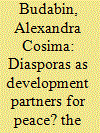

|
|
|
|
|
| Publication |
2014.
|
| Summary/Abstract |
There is increasing interest today in the relationship between diaspora groups and international development. As a stand-in for the domestic organisation in Keck and Sikkink's model of a 'transnational advocacy network', diasporas serve as important sources of legitimacy and first-hand knowledge to support the 'information politics' of host country ngos; in turn, diasporas gain access to policy making around development and conflict resolution. But these alliances present a complicated picture of power and agency with unevenness across actors. Using field research on the US-based ngo Save Darfur Coalition and its partnership with the Darfuri diaspora, I argue that a host country ngo must balance its relationships across numerous stakeholders, including the diaspora, as well as short and long-term development needs. In addition, the strength of the alliance across actors may be influenced by the status of the diaspora and the home and host country contexts.
|
|
|
|
|
|
|
|
|
|
|
|
|
|
|
|
| 20 |
ID:
107414
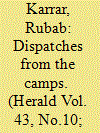

|
|
|
|
|
|
|
|